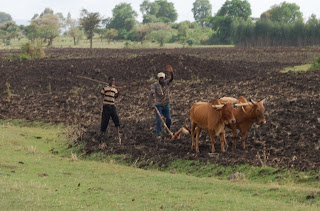Addis Ababa, Ethiopia, was truly a different world to
me. The traffic lights don’t work,
so driving is really a “free-for-all”—thankfully we didn’t drive. We stayed in the Radisson Blu, which
was a very nice hotel, but all around us was real poverty. Dave had to interview attorneys during
the two days we were there, so I was free to travel with the humanitarian
missionaries on the first day.
Elder and Sister Campbell are from Hurricane, Utah, and have had a hard
time adjusting to the difficult circumstances of their mission. We had a wonderful day together as they
took me out to a small village about 2 ½ hours from Addis—mostly on rough, dirt
roads. There were people and
animals everywhere—cows, sheep, goats, donkeys carrying everything and also
pulling little carts. There were
no cars (except our jeep-the one given to the missionaries to do their
humanitarian work in these isolated places). The people obviously had to work very hard to get by, but
life had a rhythm and they knew how to make it work. The Campbells were involved with working with the community
leaders to complete the water project they had begun. The trenches still needed to be filled in and the community
representatives needed to be trained to maintain the water system. It was fun to watch them doing such a
great job of working with the people—being strict and efficient--and yet
kind. Everywhere there were women and children hauling
water—sometimes for long distances—and sometimes from very polluted rivers. Getting water takes a large part of the
day for most of these villagers.
What a blessing it is for the Church to make it possible to get clean
water from a tap at a location very close to their home. 86% of the people in this country live
in “tukul huts”—they are round, made of wood planks stuffed with mud mortar and
they have conical thatch roofs.
They have one room inside with dirt floors. The women cook with cow dung, mixed with straw, patted into
a flat pancake and dried in the sun.
The smoke comes out through the thatch roof. The children gathered all around us wherever we went
and they’ve learned enough to know that when they see Americans they put out
their hands and say “money, money.”
One pointed at my watch and wanted me to give it to him. I didn’t. The people are extraordinarily beautiful, though, and the
children are very adorable. They
all loved having their picture taken and then seeing the preview on the camera.
This was the means of transportation--mules & carts--carrying bags of everything!
Actually, mules and women carry everything!
Ethiopians plant a lot of teff--an ancient grain--which they grind and use to make injera--a type of flat bread that they eat for every meal. Notice the handmade wooden plough.
The faces of Ethiopia. Such beautiful children always gathered around us.
This is one of the water stations. Someone in the village will be in charge of this. They will unlock it during certain hours of the day and put the faucets on it for the use of the villagers. They are responsible to guard it and maintain it.
This was a flour mill where the women were grinding their teff and their corn.
Tukul Huts--whole families sleep, cook and live in these little houses.










No comments:
Post a Comment